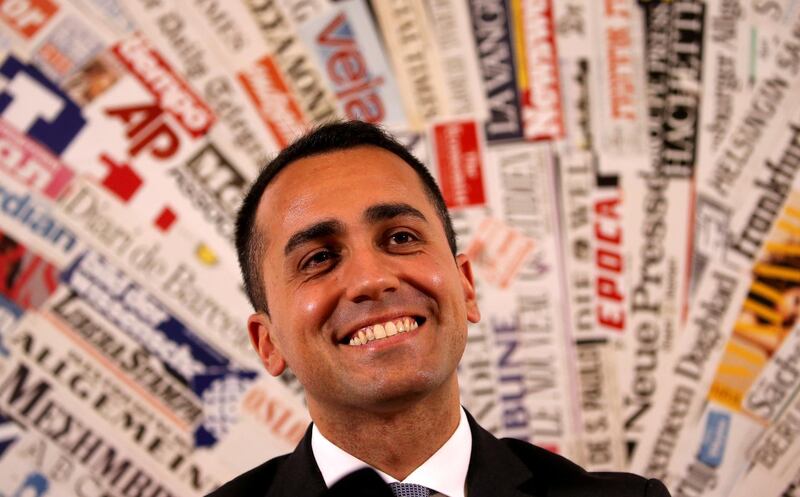Calls for fresh elections in Italy by the leader of the anti-establishment 5-Star Movement have sparked fears that the country, which has the third largest economy in Europe, faces many more months of political uncertainty.
“At this point for me there is no other solution. We have to go back to the polls as soon as possible,” Luigi Di Maio posted on Facebook on Monday.
Mr Di Maio, 31, blamed his political rivals for the failure to form a coalition government, saying they had refused to engage in talks with his party. Appealing to Matteo Salvini, the leader of the far-right League party, he said: “Let's ask together to go and vote.”
Italian financial markets came under pressure following his statement, as investors digested the prospect of a prolonged political deadlock. Italian yields pushed up further on Tuesday, having risen 3-5 basis points across the curve on Monday.
The political limbo comes after an inconclusive March 4 vote that saw a right-wing alliance including the League win the most seats but 5-Star become the largest single party. The centre-left Democratic Party finished a distant third.
_______________
Read more:
[ Italian Democratic Party considers Five Star deal to end deadlock ]
[ Posturing begins as Italy seeks end to political gridlock ]
[ Far-right, populist surge leaves Italy in limbo ]
_______________
Initial discussions between 5-Star and the League collapsed after both Mr Di Maio and Mr Salvini refused to give ground over the latter’s right-wing coalition partner, Forza Italia, which is led by former prime minister Silvio Berlusconi.
Mr Di Maio, who has his sights on becoming Italy's next prime minister, had demanded that Mr Salvini abandon the 81-year-old media mogul. However, the League leader refused to do this and he received a boost on Monday with a resounding victory for his centre-right coalition in local elections in the north-eastern Friuli Venezia Giulia region.
"We are going to govern [the country], I am ready!" Mr Salvini posted on Facebook after the win.
Mr Berlusconi said the results “confirm that we are the leading coalition in the country, in sync with what voters want and it's just one more reason to entrust us with national governance”.
The only option currently available to the right-wing coalition, however, is to form a minority government.
With a League deal looking increasingly unlikely, Mr Di Maio last week turned to the Democratic Party in an attempt to win its support. But that appeal, too, floundered after former Italian prime minister Matteo Renzi urged his centre-left party not to strike a deal with the populist 5-Star.
Mr Renzi, who stepped down as premier but still holds influence in the party, told RAI Television on Sunday: “The Democratic Party lost, I resigned, seven out of 10 Italians voted for Salvini or Di Maio. It's up to them to govern.”
His comments angered other Democrats, who accused him of trying to influence the party ahead of a meeting on Thursday called to decide on whether to enter 5-Star talks.
_______________
Read more:
[ Italy’s maverick populists top the polls as voting day arrives ]
[ Italy’s 31- and 81-year old political rivals woo mainstream voters ]
[ Italy’s Berlusconi seduces voters in final bid for power ]
_______________
Mr Di Maio blamed Mr Renzi and his “oversized ego” for blocking a potential deal.
"The Democratic Party cannot free itself of Renzi, even when he drove their party to a historic low. Today we have the proof that it is still Renzi and his oversized ego who decide everything," he wrote on Facebook.
"I never thought it would be easy to form a government, but I did not think it would be impossible," he added.
"Di Maio's statements are meant to put pressure on the Democratic Party, which is terrified of an early election where it could perform even worse than in the last one," Adriano Bosoni, senior Europe analyst for global intelligence firm Stratfor, told The National. "But the Democratic Party is internally divided, which means that even if it decides to support a government led by the 5-Star Movement, it is not a given that all its MPs would respect this decision."
President Sergio Mattarella, who has the task of breaking the deadlock, has made it clear he does not want an immediate return to the polls.
A ballot in June would also probably be very difficult to plan at such late notice, Luigi Ferrata, public affairs account director at Community Group, told The National. "If it is agreed that there should be a new vote, I think the most likely date will be in autumn, once all other options have been exhausted," he said.
Those options include Mr Mattarella appealing to all parties to back a unity government which could try and work on electoral reform.
"The Italian president will do whatever he can to avoid an early election, which would only create additional uncertainty about Italy's future,” Mr Bosoni said. “An election without a change in the electoral law could lead to another hung parliament and another round of lengthy coalition talks.
“So far, financial markets have been relatively quiet. But Italy's challenges go beyond its bond yields. It needs a stable government to negotiate eurozone reforms with France and Germany, and it also needs to approve a new budget before the end of the year.”






